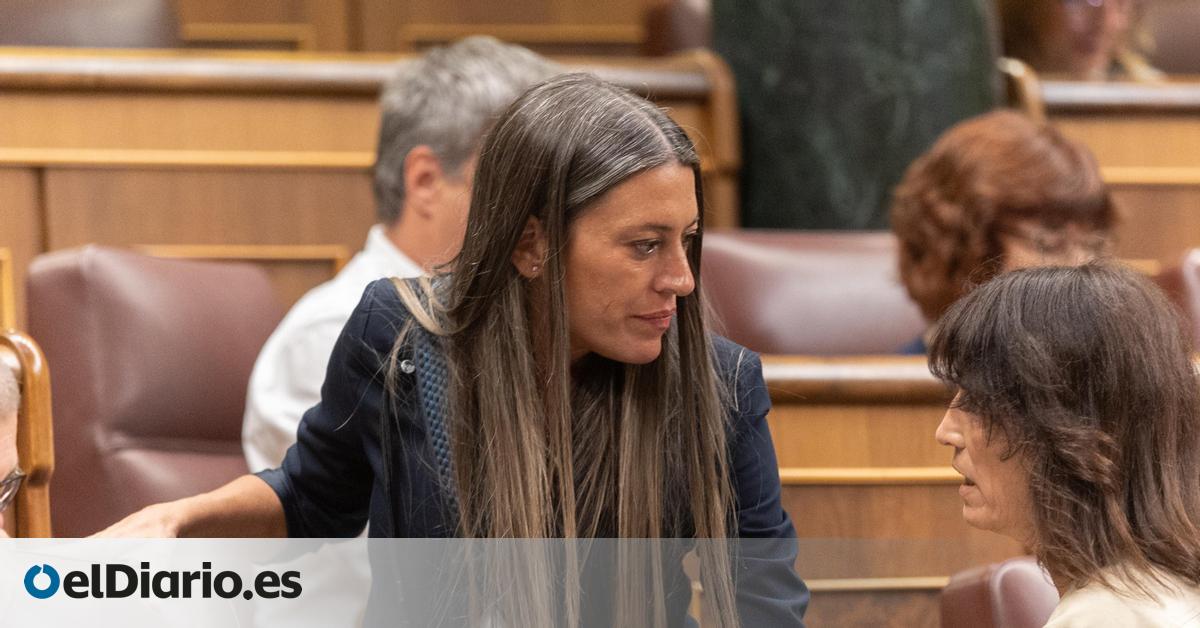
It is Junts’ umpteenth ultimatum and, therefore, no one ever knows if it will be the final one. But the slam of the door this time sounded louder than ever. “Maybe I should stop talking about time changes and start talking about the time of change,” the party spokesperson in Congress, Míriam Nogueras, told the President of the Government this Wednesday during her question time in the control session. His intervention gave rise to a general murmur in the chamber due to doubt regarding the background of that statement and the consequences for the future of the legislature. But what was clear is the tone and substance of his previous speech, indistinguishable from that of PP and Vox due to the acidity of his criticism of the Executive.
Nogueras is usually harsh with Pedro Sánchez in the control sessions, but this Wednesday he raised the form and content. “Many people are fed up with not making ends meet while they see that their taxes do not put an end to the daily torture of Renfe, or help people to build their businesses, to generate decent work, to finance education and health as they should or to finance housing, but rather they are going to pay the ransoms of the stars of the flotilla, the illegal financing of parties, prostitution, parties or to pay favors from some media outlets. communication,” he said.
He did not stop there and Nogueras spoke of the possibility of a right-wing government: “Later they will say that the right is coming and that it is our fault.” A phrase that ended with a play on words referring to the last promise announced by Pedro Sánchez, the end of the time change from summer to winter. “Perhaps you should talk less about time changes and start talking, Mr. Sánchez, about the time of change,” he concluded.
The phrase remained suspended in the air and the president responded as he usually does on other occasions to questions from his partners: he defended the Government’s policies and promised to continue working for self-employed workers and for the right to housing, two of the many things that the Junts spokesperson had reproached him with in her question. But in the halls of Congress, the change of tone of the independence supporters was planned throughout the day.
Sources from Puigdemont’s party later reaffirmed that the intervention was not “free.” “This is serious. We had never talked about change,” says a member of the parliamentary group. “Either they change or Junts’ way of doing politics in Congress will change,” add those same sources, who use a recurring simile among pro-independence deputies: “The chewing gum has stretched too much, it no longer has any more power.”
What do Junts’ warnings mean? No one is currently talking about a motion of censure with the PP, but the Government could lose the support of its seven deputies for any initiative, now that it had chained a series of important victories with the decree of arms embargo on Israel and the sustainable mobility law, as very recent examples. The Council of Ministers plans to soon approve the spending ceiling, a first test on support for the General State Budgets that it has committed to approving.
“The next few days will be important, next week we will see. But the extension will not last the entire legislature,” Junts advances about the next steps. The general secretary of the party, Jordi Turull, already spoke a few weeks ago about the end of autumn as a determining date to evaluate his support for the Government: “Before the nougat.” What some of the investiture bloc groups consulted do not understand is the reason for Junts’ new turn. According to sources from this party, it does not have to do exclusively with corruption, but with the coalition’s “way of doing politics.” The reform on self-employed quotas has been one more note on the list of complaints that Catalans accumulate against the PSOE.
The political priorities of the independentistas began to change some time ago. The Government was working on the investiture commitments from the beginning, with the approval of the amnesty law and the negotiation of official languages in the European Union. Although Carles Puigdemont’s party feels that the Executive could do more to apply the amnesty to its leader as well, the Socialists have little room for maneuver in this regard and cannot do much more in the negotiation within Europe to achieve the official status of Catalan.
In the time since the investiture agreements were approved until now, new concerns have arisen for Junts, such as the rise of the far-right pro-independence Alliance Catalana. A recent survey published in La Vanguardia observed a loss of 14 seats for the post-convergents who would go directly to the fishing grounds of Silvia Orriols’ party. Perspectives that surely explain Junts’ growing concern about talking about immigration.
That is why the defeat just a few weeks ago of the law to transfer immigration powers to Catalonia was so significant. The PSOE agreed on this text with Junts, aware of the importance of this folder for the stability of the legislature. But the fragile majority that the Government has prevented the text from even beginning to be processed: the votes of Podemos together with those of PP and Vox were enough to overthrow the initiative.
Junts is also angry about what they consider a “blockade” by the Government of the law on multiple recidivism that they registered last year and that Congress took into consideration in May 2024, with the votes of the right, the PSOE and other parties in the investiture bloc such as ERC. This law is, however, opposed by the rest of the left, including Sumar, who consider that a racist perspective hides behind the speeches that link immigration and crime.
Although the law has taken some steps in the House and is now in the hands of the Justice Commission, there has been little progress since February. This Monday, the main mayors of Junts met in Waterloo with Puigdemont and the general secretary of the party, Jordi Turull, and among other issues they raised their discomfort with the Socialist Party’s “blockade” of that law.
“Attendees have shown their concern about the lack of response from the Catalan and Spanish governments to people’s problems. They have shown their concern about the PSOE’s blockade of the laws against multiple recidivism and against criminal occupations, and have demanded that they be approved quickly,” the party summarized in a statement. Socialist sources respond on this specific issue of the law on multiple recidivism that, as in so many other laws that are being processed in Congress, “agreements are being sought to move forward.”
The Government, calm: “It is a theatricalization”
The Government, meanwhile, is trying to de-dramatize the Junts threat and does not want to take it as an ultimatum or a change of any kind. “We haven’t heard anything we haven’t heard before,” government sources say. “It’s theatrics, the same as always. Calm down,” said a minister. “They have managed to sneak their phrase into the news. We continue,” added another of those closest to the president. “One thing is the literality of the statements and another thing is what it means. We take our agreement with Junts very seriously and, within the framework that we take it seriously and they know it, we are convinced that we will be able to continue working together until the end of the legislature,” add government sources, who cling to the fact that Puigdemont’s party rules out a motion of censure with PP and Vox, which would mean the game over of the mandate.
And there they consider that they are not going to arrive and that Junts has no electoral appetite at this moment. “Everyone has their own way of applying pressure, but we have to analyze it not in accordance with literality. We understand the message, they are telling us that there are some commitments and we have always said that we will comply,” conclude the sources consulted.
The Government insists, on the other hand, on the need to end the crossed vetoes in parliamentary procedures: the ideological clashes between the left and Junts are what have so far blocked a large part of the laws requested by the independentists, but at the same time those of Carles Puigdemont have made some important measures impossible for the rest of the Government’s partners, such as the special tax on electricity companies or the popular legislative initiative for a regularization of migrants that is processed in Congress.
Another of the problems that the Executive has is that the relationship with the independentists is not as greased as before, despite the fact that former president José Luis Rodríguez Zapatero has assumed direct dialogue with Puigdemont, replacing the imprisoned Santos Cerdán. The fruits of these new conversations are conspicuous for now by their absence and Junts started the new course by punishing the Government. From there it has gone on to raise the tone. Even so, in Moncloa they do not see the wolf’s ears for now.
This same Wednesday, Junts wanted to crystallize its discursive notice in the Congressional votes. It was a non-binding initiative, but it has served to cause the Government to find itself with an uncomfortable photo: that of the PP and Vox bench adding a majority together with the seven pro-independence deputies. Junts has supported a PP motion to urge the Executive to make a downward review of the taxes paid by families and the self-employed. Specifically, they have supported a point about adjusting personal income tax to inflation to compensate for “the loss of purchasing power.”
Together and Illa, unable to meet
What happens in Congress has an obvious line of connection with the current situation in Catalan politics and the complicated relations between Puigdemont and the president of the Generalitat, Salvador Illa. Junts returned from the summer vacation with the purpose of making changes to its strategy in the Parliament of Catalonia. The analysis made by the management was that Junts had not taken advantage of all possible power due to their reluctance to agree with the PSC in municipalities and councils, at the same time that the frontal opposition to the Government gave them less visibility than they could have by dragging Salvador Illa to their positions.
With this reflection in the rearview mirror, Puigdemont opted to mark the general policy debate as a temperature check on the health of his pact with Pedro Sánchez. Specifically, Junts demanded that the PSC support some of its key resolution proposals and, specifically, one in which it supported the resolution of the conflict in Catalonia through a referendum.
Junts then spread that, if there were agreements in the Parliament, they could support the budgets of the Generalitat, one of Illa’s pending issues. However, PSC and Junts never reached an agreement, so most of the resolutions presented by Puigdemont, including the referendum, were discarded.
As a result of this latest clash, Junts has contented itself with its role and has redoubled its opposition to Illa, which includes the threat, again, of ending the pact with Sánchez. At Junts they consider that, without progress at the Geneva table, without the amnesty having been applied and, to top it off, without being able to find a new fit in relation to the Government of Catalonia, support for the PSOE makes less and less sense.
Source: www.eldiario.es

